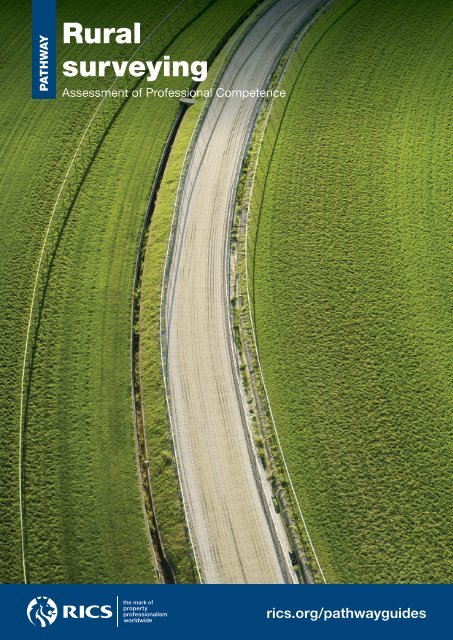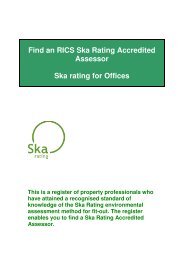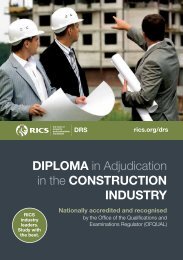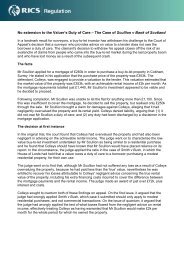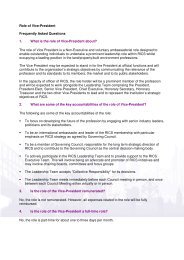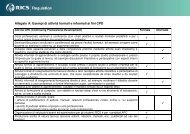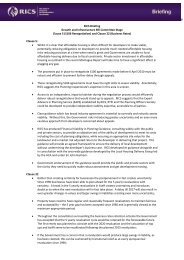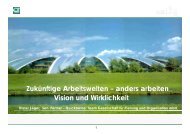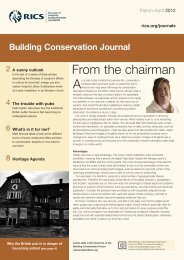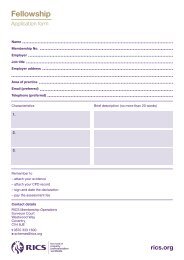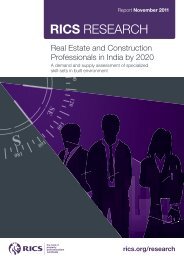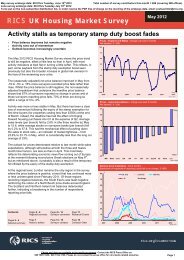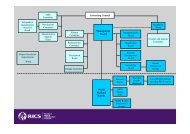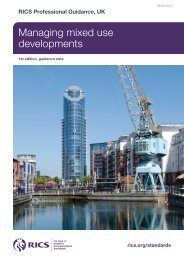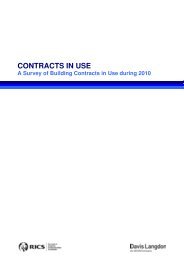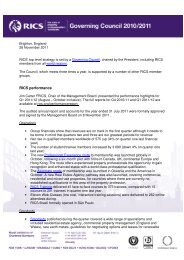Rural surveying - RICS
Rural surveying - RICS
Rural surveying - RICS
Create successful ePaper yourself
Turn your PDF publications into a flip-book with our unique Google optimized e-Paper software.
<strong>Rural</strong><br />
<strong>surveying</strong><br />
Assessment of Professional Competence<br />
rics.org/pathwayguides
Published by: <strong>RICS</strong>, Parliament Square, London SW1P 3AD<br />
All rights in this publication, including full copyright or publishing right, content and design, are owned by <strong>RICS</strong>,<br />
except where otherwise described. Any dispute arising out of this publication is subject to the law and jurisdiction<br />
of England and Wales.<br />
02<br />
RURAL SURVEYING
Contents<br />
Introduction 04<br />
Pathway requirements 07<br />
<strong>Rural</strong> APC 07<br />
Competency guidance 08<br />
Access and rights over land (T001) 09<br />
Accounting principles and procedures (M001) 10<br />
Agriculture (T002) 11<br />
Auctioneering (T004) 12<br />
Capital taxation (T009) 13<br />
Compulsory purchase and compensation (T011) 14<br />
Conflict avoidance, management and dispute resolution procedures (M006) 15<br />
Development appraisals (T023) 17<br />
Forestry and woodland management (T034) 18<br />
Investment management (including fund and portfolio management) (T046) 19<br />
Landlord and tenant (including rent reviews and lease renewals) (T048) 20<br />
Land use and diversification (T049) 21<br />
Management of the natural environment and landscape (T055) 22<br />
Planning (T061) 23<br />
Property finance and funding (T069) 24<br />
Property management (T070) 25<br />
Purchase and sale (T073) 26<br />
Strategic real estate consultancy (T079) 27<br />
Sustainability (M009) 28<br />
Valuation (T083) 29<br />
RURAL SURVEYING 03
Introduction<br />
About the APC<br />
The <strong>RICS</strong> Assessment of Professional Competence (APC)<br />
ensure that those applying for <strong>RICS</strong> membership are competent<br />
to practise and meet the high standards of professionalism<br />
required by <strong>RICS</strong>. There is a wide range of pathways available<br />
to qualify as an <strong>RICS</strong> member covering 22 different areas<br />
of practice.<br />
The APC normally consist of:<br />
• a period of structured training<br />
• a final assessment.<br />
The structured training is based on candidates achieving a set<br />
of requirements or competencies. These are a mix of technical,<br />
professional, interpersonal, business and management skills.<br />
How to use this guide<br />
This guide supports the core 2006 APC documentation. It is<br />
designed to help you understand more about qualifying<br />
as an <strong>RICS</strong> member in rural <strong>surveying</strong>. The guide is based<br />
on UK market practice and may be unsuitable for candidates<br />
based in other countries. The material is set out in three sections.<br />
Section one – provides information on this area of<br />
practice with a general overview of the rural pathways.<br />
Section two – lists the competency requirements of the<br />
rural APC (as set out in the APC Requirements and<br />
competencies guide February 2012).<br />
Section three – describes the main technical competencies<br />
associated with rural <strong>surveying</strong>, providing expanded sector<br />
specific guidance on each of them. This forms the main part<br />
of the guide.<br />
04<br />
RURAL SURVEYING<br />
You MUST use this guide in conjunction with the<br />
2006 core APC documentation which is available<br />
on the <strong>RICS</strong> website and comprises:<br />
• APC Requirements and competencies guide<br />
– February 2012<br />
• Candidate guides (2006) – (the particular<br />
candidate guide you need will depend on your<br />
route to membership)<br />
• Guide for supervisors, counsellors and<br />
employers – graduate route to membership,<br />
July 2006.
Introduction<br />
About the competencies<br />
The APC aims to assess that you are competent to<br />
carry out the work of a qualified chartered surveyor. To be<br />
competent is to have the skill or ability to perform a task or<br />
function. The <strong>RICS</strong> competencies are not just a list of tasks<br />
or functions, they are also based upon attitudes and behaviours.<br />
The competencies have been drawn up in a generic way<br />
so that they can be applied to different areas of practice<br />
and geographical locations. This guide is designed to help<br />
you interpret these competencies within the context of<br />
<strong>Rural</strong> <strong>surveying</strong>.<br />
The competencies are defined at three levels of attainment<br />
and each APC pathway has its own specific combination of<br />
competencies that you must achieve at the appropriate level.<br />
You must reach the required level in a logical progression and<br />
in successive stages:<br />
Level 1 – knowledge and understanding<br />
Level 2 – application of knowledge and understanding<br />
Level 3 – reasoned advice and depth of technical knowledge.<br />
The competencies are in three distinct categories:<br />
Mandatory competencies – the personal, interpersonal,<br />
professional practice and business competencies common<br />
to all pathways and compulsory for all candidates. These<br />
are explained in more detail in the APC Requirements and<br />
competencies guide – February 2012.<br />
Core competencies – the primary competencies of your<br />
chosen APC pathway.<br />
Optional competencies – a set of competencies selected by<br />
the candidate from a list defined for the particular pathway. In<br />
most cases there is an element of choice. These are mostly<br />
technical competencies, but certain mandatory competencies<br />
also appear on the optional competency list and candidates<br />
are permitted to select one of these at a higher level.<br />
This guide only deals with the principal core and<br />
optional competencies associated with this area.<br />
It does not cover the mandatory competencies.<br />
Choosing your competencies<br />
It is important that you give careful thought to your choice<br />
and combination of competencies. Your choice will inevitably<br />
reflect the work you do in your day-to-day environment<br />
(driven by the needs of your clients/employer). Your choice<br />
and combination of competencies will be a reflection of your<br />
judgement. At final assessment, the assessors will take these<br />
choices into account. They will expect you to present a sensible<br />
and realistic choice that reflects the skills needed to fulfil the<br />
role of a surveyor in your field of practice.<br />
This guide should help candidates and employers with a<br />
degree of assistance in choosing the competencies that are<br />
most appropriate to their area of practice.<br />
How to find help<br />
<strong>RICS</strong> has a fully trained Contact Centre team who will be able<br />
to help you with any general APC queries:<br />
<strong>RICS</strong> HQ<br />
Parliament Square<br />
London SW1P 3AD<br />
United Kingdom<br />
t +44 (0)870 333 1600<br />
f +44 (0)20 7334 3811<br />
contactrics@rics.org<br />
www.rics.org<br />
RURAL SURVEYING 05
Introduction<br />
About <strong>Rural</strong> <strong>surveying</strong><br />
The countryside is ever evolving and professional advice<br />
on how emerging regulations and practices affect a client’s<br />
business plans has never been more valuable. <strong>Rural</strong> surveyors<br />
enable the rural economy and environment to thrive and<br />
flourish in a variety of ways by virtue of their experience and<br />
expertise across a very broad and diverse range of activities.<br />
The work of a rural surveyor draws on a wide range of<br />
professional and technical skills and knowledge in key areas<br />
including agriculture, management of the natural environment<br />
and landscape, property management and valuation.<br />
Specifically rural surveyors may find themselves working<br />
across a number of different but complementary areas for<br />
example: rural estate management, agriculture, planning,<br />
valuation, auctioneering, and asset management to mention<br />
but a few. Being a rural surveyor means understanding how<br />
the countryside works and the interrelationships that exist in<br />
terms of the people who live and work there.<br />
The role of the rural surveyor is increasingly involved not only<br />
in professional and technical aspects, but also in business,<br />
resources management, consultancy and as leaders in the<br />
rural community.<br />
The role of the rural surveyor is changing. One of the most<br />
marked developments is the increasing level of specialisation<br />
that is occurring.<br />
06<br />
RURAL SURVEYING<br />
<strong>RICS</strong> qualification pathways in this sector:<br />
<strong>Rural</strong> APC<br />
The rural pathway is ideal for anyone who has a particular<br />
interest in contributing to the maintenance and enhancement<br />
of a healthy rural environment and the functioning of a vibrant<br />
rural economy.<br />
The rural pathway places emphasis on competency in<br />
agriculture (which is required to a minimum of level 2 in this<br />
pathway). However, as with other pathways, a broad base of<br />
experience in general rural practice is also required. The rural<br />
pathway is quite individual and does not have the same level<br />
of crossover as others pathways experience. There is a<br />
crossover with the valuation pathway however, and candidates<br />
undertaking the rural pathway may gain their experience in a<br />
valuation context.
Pathway requirements<br />
<strong>Rural</strong> APC<br />
Mandatory competencies<br />
You must achieve the minimum levels as set out in the<br />
mandatory competencies.<br />
Core competencies<br />
One competency to Level 3 from the list below.<br />
• Agriculture (T002)<br />
• Management of the natural environment and<br />
landscape (T055)<br />
• Property management (T070)<br />
• Valuation (T083)<br />
Optional competencies<br />
Three competencies to Level 3 and two competencies to<br />
Level 2 from the list below (including any core competencies<br />
not already used*).<br />
• Access and rights over land (T001)<br />
• Agriculture (T002)<br />
• Auctioneering (T004)<br />
• Capital taxation (T009)<br />
• Compulsory purchase and compensation (T011)<br />
• Development appraisals (T023)<br />
• Forestry and woodland management (T034)<br />
• Investment management (including fund and portfolio<br />
management) (T046)<br />
• Landlord and tenant (including rent reviews and lease<br />
renewals) (T048)<br />
• Land use and diversification (T049)<br />
• Planning (T061)<br />
• Property finance and funding (T069)<br />
• Purchase and sale (T073)<br />
• Strategic real estate consultancy (T079)<br />
• Accounting principles and procedures (M001) or Conflict<br />
avoidance, management and dispute resolution procedures<br />
(M006) or Sustainability (M009)<br />
Plus one competency to Level 3 or two competencies to<br />
Level 2 from the full list of technical competencies, including<br />
any not already chosen from the lists on this page.<br />
Notes:<br />
*If agriculture has not been selected as the one core, it<br />
must be taken as one of the optional competencies to<br />
either Level 3 or Level 2.<br />
RURAL SURVEYING 07
Competency guide<br />
The pages that follow are intended to provide guidance<br />
for users on the main competencies associated with<br />
<strong>Rural</strong> <strong>surveying</strong>.<br />
The guidance has been drawn up by experienced practitioners<br />
and aims to give you a clear and practical understanding of<br />
how to apply the listed core and optional competencies in the<br />
context of residential survey and valuation. The guidance does<br />
not cover the mandatory competency requirements.<br />
The official competency definitions (at levels one, two and<br />
three) are provided, followed by a description of the key<br />
knowledge and activities that are likely to fall within the scope<br />
of each competency.<br />
The information provided is designed to be helpful but informal<br />
guidance. The knowledge and activities described under each<br />
competency are not exhaustive, and should not be relied upon<br />
as any form of revision list. Candidates must satisfy themselves<br />
and their employers that they have reached the required level<br />
of attainment before applying for final assessment.<br />
The competencies are arranged in alphabetical order.<br />
The full list of <strong>RICS</strong> competencies and pathway requirements<br />
can be found in the APC Requirements and competencies guide<br />
– February 2012.<br />
08 RURAL SURVEYING<br />
08
Competency guide<br />
Access and rights over land<br />
Reference no. T001<br />
Description of competency in context of this sector<br />
This competency is about access and easements for power, water and communications<br />
infrastructure, including wayleaves, and the differing methods of acquisition and compensation<br />
negotiations, including fees.<br />
Examples of likely knowledge, skills and experience at each level<br />
Level 1<br />
Demonstrate knowledge and understanding<br />
of the legislation and/or framework for<br />
acquiring sites or access for the provision<br />
of power, water, pipelines, other third party or<br />
communications infrastructure. This should<br />
include the methodology and techniques used<br />
in valuation for these purposes.<br />
Examples of knowledge comprised within<br />
this level are:<br />
• The processes involved in the acquisition of<br />
land for the purposes of establishing access<br />
agreements, wayleaves and easements for<br />
the provision of power, water, pipelines or<br />
communications infrastructure<br />
• Compensation procedures associated with<br />
such acquisitions, including any temporary<br />
accommodation and other works required for<br />
the construction and maintenance of<br />
infrastructure on the land acquired.<br />
Level 2<br />
Provide evidence of identifying and<br />
understanding the appropriate routing<br />
for lines, cables and other third party<br />
infrastructure. This should include associated<br />
environmental assessment: undertaking<br />
inspections, and evaluating and negotiating<br />
payments for their use or acquisition.<br />
Examples of activities and knowledge<br />
comprised within this level are:<br />
• Negotiating with occupiers and companies<br />
regarding the routes, accommodation<br />
works, temporary works, and reinstatement<br />
and compensation<br />
• Agreeing heads of terms and<br />
final documentation.<br />
Level 3<br />
Provide evidence of reasoned advice,<br />
undertake valuations on, and write reports in<br />
relation to all matters relating to, provision of<br />
power, water, pipelines, other third party or<br />
communications infrastructure.<br />
Examples of activities and knowledge<br />
comprised within this level are:<br />
• Providing strategic advice on complex<br />
elements of the subject including<br />
dispute resolution<br />
• Preparing and providing strategic advice<br />
on unusual or challenging cases.<br />
RURAL SURVEYING 09
Competency guide<br />
Accounting principles and procedures<br />
Reference no. M001<br />
Description of competency in context of this sector<br />
This competency covers the basic principles of accounting and the interpretation of company accounts<br />
in order that reasoned advice can be given to clients.<br />
Examples of likely knowledge, skills and experience at each level<br />
Level 1<br />
Demonstrate knowledge and understanding<br />
of accounting concepts and the format and<br />
preparation of management and company<br />
accounts, including profit and loss statements,<br />
cash flow statements and balance sheets.<br />
Examples of knowledge comprised within<br />
this level are:<br />
• An awareness of the Generally Accepted<br />
Accounting Principles (GAAP) relevant to the<br />
candidate’s geographical area of experience<br />
and how property is treated in an<br />
entity’s accounts<br />
• An awareness of International Accounting<br />
Standards (IAS), broadly how IAS vary from<br />
National GAAP and how property is treated<br />
in an entity’s accounts prepared under IAS<br />
• An understanding of an entity’s financial<br />
results and basic accounting principles<br />
including balance sheets, profit and loss and<br />
cash flow statements<br />
• An understanding of the role of the auditor.<br />
10 RURAL SURVEYING<br />
Level 2<br />
Provide evidence of interpretation of<br />
company accounts and balance sheets<br />
in your area of practice and application<br />
of appropriate accounting and<br />
regulatory standards.<br />
Examples of activities and knowledge<br />
comprised within this level are:<br />
• The application of knowledge obtained to<br />
achieve Level 1 above and specific knowledge<br />
of the accounting standards that relate<br />
to property<br />
• Considering financial statements to establish,<br />
for example, the financial strength of an entity<br />
• Reviewing and understanding analysts’<br />
reports on financial statements,<br />
eg Dun & Bradstreet<br />
• Considering and understanding common<br />
financial measures such as return on capital<br />
employed, NAV, net assets per share, gearing<br />
ratio, EBIT, EBITDA and PE ratio.<br />
Level 3<br />
Provide evidence of reasoned advice<br />
given to clients with regard to profit and<br />
loss statements and balance sheets.<br />
Examples of activities and knowledge<br />
comprised within this level are:<br />
• Providing clients, in an appropriately<br />
supervised manner, with reasoned advice<br />
relating to the financial standing of a company<br />
eg for agency activities such as leasing, buying<br />
and selling or to assess suitability for a<br />
commercial relationship<br />
• Preparing, or assisting in the preparation of,<br />
service charge accounts<br />
• Preparing, or assisting in the preparation of,<br />
management accounts for a property<br />
• Preparing, or assisting in the preparation of,<br />
an entity’s accounts ie balance sheet, profit<br />
and loss and cash flow statements<br />
• Providing other professional advice related<br />
to the interpretation and/or preparation<br />
of accounts.
Competency guide<br />
Agriculture<br />
Reference no. T002<br />
Description of competency in context of this sector<br />
This competency is about farming systems and the management of agricultural land.<br />
Examples of likely knowledge, skills and experience at each level<br />
Level 1<br />
Demonstrate knowledge and understanding<br />
of the principles, characteristics and<br />
organisation of agriculture according<br />
to different geographical, soil and<br />
climatic conditions.<br />
Examples of knowledge comprised within<br />
this level are:<br />
• Basic crop and animal husbandry<br />
• Timings of relevant operations<br />
• Legislation that affects agriculture and<br />
the bodies that are responsible for delivery<br />
and enforcement<br />
• Current economic state of agriculture<br />
• Farm support systems.<br />
Level 2<br />
Demonstrate application of the principles<br />
and systems of practical farming methods.<br />
This includes the requirements and<br />
characteristics of yields; current market<br />
prices of agricultural produce and livestock;<br />
costs of production; and the utilisation and<br />
cost of farm buildings.<br />
Examples of activities and knowledge<br />
comprised within this level are:<br />
• Arable – advising on crop rotations,<br />
cultivations, crop husbandry and marketing<br />
of product<br />
• Livestock – advising on livestock enterprises,<br />
animal husbandry and welfare including<br />
record keeping and marketing<br />
• Generic – dealing with relevant regulations<br />
that affect all aspects of agriculture<br />
• Preparing detailed farm finance plans<br />
and budgets.<br />
Level 3<br />
Provide evidence of reasoned advice given<br />
to stakeholders on the management and<br />
practical application of appropriate methods<br />
and requirements of farming.<br />
Examples of activities and knowledge<br />
comprised within this level are:<br />
• Providing professional farm management<br />
advice in both written and oral form.<br />
RURAL SURVEYING<br />
11
Competency guide<br />
Auctioneering<br />
Reference no. T004<br />
Description of competency in context of this sector<br />
This competency reflects the complex factors governing auctioneering. It includes aspects of law<br />
of sale and contract, misdescription etc, as well as requiring the candidate to have knowledge of the<br />
auction process and the reasons for recommending sale by auction (or otherwise) over and above<br />
other methods of disposal.<br />
Examples of likely knowledge, skills and experience at each level<br />
Level 1<br />
Demonstrate knowledge and understanding<br />
of the basic principles and legal obligations<br />
of auction. This should include preparation<br />
for, and procedures prior to or during,<br />
an auction.<br />
Examples of knowledge comprised within<br />
this level are:<br />
• The principles of the law governing auction<br />
and its implications<br />
• An understanding of the process of how an<br />
auction works, including an understanding of<br />
the information required prior to auction and<br />
the process on the day.<br />
12 RURAL SURVEYING<br />
Level 2<br />
Provide evidence of the practical application<br />
of your knowledge to the preparation for the<br />
sale of property at auction and procedures<br />
prior to or during an auction.<br />
Examples of activities and knowledge<br />
comprised within this level are:<br />
• Compiling information relating to property<br />
to be sold at auction<br />
• Assisting in the process of drawing up<br />
auction catalogues<br />
• Dealing with queries and issues raised prior<br />
to the auction in consultation with others<br />
• Dealing with issues arising post auction in<br />
consultation with others.<br />
Level 3<br />
Provide evidence of reasoned advice<br />
based on a thorough working knowledge<br />
and experience of the auction process,<br />
including experience of selling at auction.<br />
Examples of activities and knowledge<br />
comprised within this level are:<br />
• Advising clients on the suitability of sale<br />
by auction<br />
• Attending an auction and selling lots<br />
• Dealing with a sale by auction from start<br />
to completion.
Competency guide<br />
Capital taxation<br />
Reference no. T009<br />
Description of competency in context of this sector<br />
This competency includes valuations and negotiations for inheritance tax – capital gains tax – which<br />
may also include advising on stamp duty, capital allowances and advising on litigation. It involves<br />
measurement of and analysis of comparables and application of evidence to resolve negotiations.<br />
It also includes application of statute and case law.<br />
Examples of likely knowledge, skills and experience at each level<br />
Level 1<br />
Demonstrate knowledge and understanding<br />
of the relevant provisions for capital taxation<br />
of real estate, equipment and/or other property.<br />
Examples of knowledge comprised within<br />
this level are:<br />
• Principles of measurement (including Code<br />
of measuring practice)<br />
• Application of statute and case law<br />
• Analysis of evidence and relevance of the law<br />
of landlord and tenant<br />
• Valuation methods applicable to different<br />
types of property.<br />
Level 2<br />
Undertake valuations and negotiations<br />
for a variety of different property types using<br />
different valuation methods for the purposes<br />
of capital taxation.<br />
Examples of activities and knowledge<br />
comprised within this level are:<br />
• Undertaking measurement and inspection<br />
• Undertaking valuation of a range of<br />
property types<br />
• Using different methods of valuation:<br />
using comparables, the investment method,<br />
profits and discounted cash flow techniques<br />
where appropriate<br />
• Negotiating valuations and settlement of cases.<br />
Level 3<br />
Provide evidence of reasoned advice to<br />
stakeholders (to include senior management<br />
within your organisation, clients and courts/<br />
tribunal members) in respect of specific cases<br />
and/or other capital taxation issues.<br />
Examples of activities and knowledge<br />
comprised within this level are:<br />
• Advising on settlement or litigation of cases<br />
• Advising on the costs of options and actions<br />
• Advising on the impact of such actions across<br />
the wider arena.<br />
RURAL SURVEYING<br />
13
Competency guide<br />
Compulsory purchase and compensation<br />
Reference no. T011<br />
Description of competency in context of this sector<br />
The understanding and practical application, within the appropriate legal framework, of compulsory<br />
purchase powers, including the assessment of and claim for compensation. The candidate is expected<br />
to have an understanding from both the acquiring authority and claimant’s position.<br />
Examples of likely knowledge, skills and experience at each level<br />
Level 1<br />
Demonstrate knowledge and understanding<br />
of the powers and procedures of government<br />
and other bodies in relation to compulsory<br />
purchase and compensation. This should<br />
cover interests in real estate and the rights<br />
of owners and occupiers of the various<br />
interests in property.<br />
Examples of knowledge comprised within<br />
this level are:<br />
• The historical background, requirement for<br />
and justification of the use of compulsory<br />
purchase powers<br />
• An overview of the various Acts of Parliament<br />
covering acquisition of land and rights,<br />
planning and compensation<br />
• The basic principles of compensation (the<br />
before and after principle), accommodation<br />
works, betterment, equivalence and the legal<br />
right to claim.<br />
14 RURAL SURVEYING<br />
Level 2<br />
Assist in the preparation of the various<br />
stages involved in the process of compulsory<br />
purchase including the estimation of a claim<br />
for compensation.<br />
Examples of activities and knowledge<br />
comprised within this level are:<br />
• Outlining the stages and timing involved in<br />
making, confirming and implementing a<br />
compulsory purchase order<br />
• An understanding of statutory abilities to<br />
acquire rights other than outright purchase,<br />
such as those exercised by utilities<br />
companies<br />
• Setting out heads of claim under a<br />
compensation claim<br />
• Being aware of and using appropriately the<br />
relevant statutory and case law in the<br />
assessment of a claim for compensation.<br />
Level 3<br />
Provide evidence of reasoned advice<br />
in relation to the validity and level of a<br />
claim for compensation, using a variety of<br />
valuation methodologies appropriate for the<br />
circumstances of the claim. Take an active<br />
role in the negotiation of claims, using a variety<br />
of bases of statutory and other valuation<br />
methodologies. Provide reasoned advice on<br />
the role of compulsory purchase in facilitating<br />
planning and regeneration initiatives.<br />
Examples of activities and knowledge<br />
comprised within this level are:<br />
• Supplying and justifying evidence for a<br />
statement of claim using both valuation and<br />
logical techniques to back up the quantum<br />
of the claim<br />
• Dealing with best practice in the<br />
implementation of a compulsory purchase<br />
order on, for example, a road scheme<br />
• Developing a rationale for the use of<br />
compulsory purchase powers in order to<br />
enable development, taking into account<br />
human rights legislation<br />
• Being aware of the fee basis for chartered<br />
surveyors and the role of the Lands Tribunal<br />
as well as mediation/arbitration.<br />
• Assisting in the preparation for and attendance<br />
at a Public Inquiry into a Compulsory Purchase<br />
Order, including understanding of procedure<br />
and process.
Competency guide<br />
Conflict avoidance, management and dispute<br />
resolution procedures<br />
Reference no. M006<br />
Description of competency in context of this sector<br />
This competency covers knowledge, understanding and application of a range of processes related<br />
to dispute/conflict avoidance, management and dispute resolution.<br />
Examples of likely knowledge, skills and experience at each level<br />
Level 1<br />
Demonstrate knowledge and understanding<br />
of the techniques for conflict avoidance,<br />
conflict management and dispute resolution<br />
procedures including for example<br />
adjudication and arbitration, appropriate to<br />
your APC pathway.<br />
Examples of knowledge comprised within<br />
this level are:<br />
A basic knowledge and understanding of<br />
some of the following, as most appropriate<br />
to your market sector/areas of specialism:<br />
• Common causes of disputes<br />
• The contribution of some of the following<br />
to dispute avoidance:<br />
- Risk management – its basic principles<br />
and techniques<br />
- Early warning systems<br />
- Partnering techniques<br />
- Clear and robust client briefings.<br />
• Theories of negotiation and the role of<br />
effective communication and negotiation<br />
• The primary features, advantages and<br />
disadvantages of a range of dispute resolution<br />
procedures and their surrounding statutory<br />
and/or non-statutory legal/judicial context<br />
(eg how forms of contract deal with dispute<br />
resolution, and the scope of such clauses):<br />
- Mediation (could include contracted<br />
and project mediation) and conciliation<br />
Level 2<br />
Provide evidence of practical application in<br />
your area of practice having regard to the<br />
relevant law.<br />
Examples of activities and knowledge<br />
comprised within this level are:<br />
• Advising clients of the most suitable means<br />
of dispute avoidance on their projects, and of<br />
dispute resolution procedures appropriate to<br />
their individual circumstances, demonstrating<br />
appreciation of when to seek further specialist<br />
advice and when to advise clients within<br />
the scope of the PI cover of the<br />
candidate’s organisation<br />
• Adopting – or encouragement of the<br />
adoption of (as appropriate) – suitable<br />
dispute avoidance techniques<br />
• Negotiating actively on behalf of clients<br />
(eg negotiations of a dilapidations claim,<br />
a party wall award or final account on a<br />
construction project) prior to third<br />
party referral<br />
• Assisting in the collation or preparation<br />
of claims/counter-claims and submissions<br />
• Assisting in the identification, gathering<br />
and collation of facts and expert evidence<br />
for use in expert reports<br />
Level 3<br />
Provide evidence of the application of the<br />
above in the context of advising clients in the<br />
various circumstances referred to above.<br />
Examples of activities and knowledge<br />
comprised within this level are:<br />
• Involvement in, or assistance with, a<br />
referral to a third party resolution process<br />
and associated management of that process<br />
on behalf of client<br />
• NB: Please note that the roles of acting as a<br />
third party dispute resolver, expert witness, or<br />
advocate, are – for the vast majority of APC<br />
candidates – not likely to be an activity that is<br />
undertaken. It is only a small minority of<br />
candidates with substantive work experience<br />
for whom this is likely to be relevant.<br />
continued on next page><br />
RURAL SURVEYING<br />
15
Conflict avoidance, management and dispute<br />
resolution procedures (continued)<br />
Reference no. M006<br />
Description of competency in context of this sector<br />
This competency covers knowledge, understanding and application of a range of processes related<br />
to dispute/conflict avoidance, management and dispute resolution.<br />
Examples of likely knowledge, skills and experience at each level<br />
Level 1<br />
Demonstrate knowledge and understanding<br />
of the techniques for conflict avoidance,<br />
conflict management and dispute resolution<br />
procedures including for example<br />
adjudication and arbitration, appropriate to<br />
your APC/ATC pathway.<br />
Examples of knowledge comprised within<br />
this level are:<br />
- Early Neutral Evaluation (ENE)<br />
- Dispute Resolution Boards (DRBs)<br />
- Dispute Resolution Advisers (DRAs)<br />
- Adjudication (under the HGCRA ’96 or<br />
geographically applicable law)<br />
- Independent expert determination<br />
- Arbitration; med-arb<br />
- Litigation.<br />
• The possible roles of a surveyor as an expert<br />
witness and/or an advocate, to include an<br />
awareness of the existence and scope of<br />
applicability of the <strong>RICS</strong> Practice Statements<br />
and Guidance Notes for expert witnesses<br />
and advocates<br />
• The range of nominating bodies and services<br />
available to resolve disputes, and<br />
particularly the role of the <strong>RICS</strong> Dispute<br />
Resolution Service and any specialized<br />
dispute resolution schemes it offers relevant<br />
to your market sector eg PACT.<br />
16 RURAL SURVEYING<br />
Level 2<br />
Provide evidence of practical application in<br />
your area of practice having regard to the<br />
relevant law.<br />
Examples of activities and knowledge<br />
comprised within this level are:<br />
• Sufficient understanding of the main points<br />
of the statutory or non-statutory law relevant<br />
to/underpinning any particular dispute<br />
resolution process (e in England and Wales,<br />
Arbitration Act 1996, or HGCRA ’96 Part II,<br />
CPR, Party Wall Act 1996 etc) and its<br />
application.<br />
Level 3<br />
Provide evidence of the application of the<br />
above in the context of advising clients in the<br />
various circumstances referred to above.
Competency guide<br />
Development appraisals<br />
Reference no. T023<br />
Description of competency in context of this sector<br />
This competency is about the role of development appraisals in residential and commercial<br />
development. Development appraisals also have a role in residual valuations of development<br />
sites but it should be remembered that the two are different activities.<br />
Examples of likely knowledge, skills and experience at each level<br />
Level 1<br />
Demonstrate knowledge and understanding<br />
of the principles and practices underlying a<br />
valid development appraisal.<br />
Examples of knowledge comprised within<br />
this level are:<br />
• The role of development appraisals in the<br />
marketplace and the situations where their<br />
use is appropriate<br />
• The content of appraisals and how different<br />
issues such as planning requirements can<br />
be reflected<br />
• The sensitivities of appraisals, what factors<br />
affect the appraisal<br />
• Awareness of external factors which have<br />
an influence upon the appraisal process.<br />
Level 2<br />
Identify, select, assemble and analyse<br />
data relevant to carrying out development<br />
appraisals. Undertake appraisals using<br />
relevant techniques and methodology<br />
and identify possible sources of<br />
development funding.<br />
Examples of activities and knowledge<br />
comprised within this level are:<br />
• Analysing appropriate sources of information<br />
and data<br />
• Preparing appraisals for possible acquisition,<br />
disposal or valuation of development sites<br />
including residential, commercial and/or<br />
mixed use<br />
• Using different techniques and software<br />
available for appraisals (whilst having an<br />
understanding of the basic principles of<br />
development appraisal)<br />
• Undertaking a sensitivity analysis<br />
• Assisting in the selection of appropriate<br />
sources of development finance.<br />
Level 3<br />
Interpret and provide evidence of reasoned<br />
advice on development appraisals and<br />
further opportunities.<br />
Examples of activities and knowledge<br />
comprised within this level are:<br />
• Using development appraisals to advise<br />
on the acquisition, disposal or valuation of<br />
development sites<br />
• Producing reasoned analysis of risk using<br />
appropriate sensitivity analysis<br />
• Advising on the appropriate sources of<br />
development finance.<br />
RURAL SURVEYING<br />
17
Competency guide<br />
Forestry and woodland management<br />
Reference no. T034<br />
Description of competency in context of this sector<br />
This competency covers silvicultural and environmental management of woodland. It includes<br />
the management of plantations from planting to felling, with all associated relevant operations<br />
for effective maintenance.<br />
Examples of likely knowledge, skills and experience at each level<br />
Level 1<br />
Demonstrate the ability to describe the<br />
silvicultural requirements, and the tree<br />
identification and silvicultural characteristics,<br />
of the main commercial and amenity species.<br />
Demonstrate knowledge and understanding<br />
of current grant regimes.<br />
Examples of knowledge comprised within<br />
this level are:<br />
• The main commercial and amenity tree species<br />
• The silvicultural requirements of those species<br />
• Knowledge and understanding of current<br />
legislation and grant regimes.<br />
18 RURAL SURVEYING<br />
Level 2<br />
Demonstrate the ability to apply your<br />
understanding of silviculture to the<br />
establishment and management of different<br />
forest and woodland systems. Demonstrate<br />
an understanding of the practice of silviculture<br />
from seed through establishment of crops,<br />
through to thinning and harvesting.<br />
Demonstrate an understanding of current<br />
forestry policy and its impact on<br />
grant regimes.<br />
Examples of activities and knowledge<br />
comprised within this level are:<br />
• Providing advice on a range of woodland<br />
management issues<br />
• Advising on the planting and establishment<br />
of trees and grant applications<br />
• Advising on silvicultural practice including<br />
harvesting and marketing.<br />
Level 3<br />
Demonstrate experience of the economics<br />
and financial implications of various types<br />
of forest and woodland systems; preparation<br />
and submission of forest and woodland grant<br />
scheme applications; calculation of timber<br />
yields, forecasting, and use of plans and<br />
recording systems; carrying out valuation<br />
of trees and stands of timber; and drawing<br />
up of thinning and harvest programmes.<br />
Examples of activities and knowledge<br />
comprised within this level are:<br />
• Preparing woodland management plans<br />
• Providing strategic advice to clients to<br />
support decision making by estate managers.
Competency guide<br />
Investment management<br />
Reference no. T046<br />
Description of competency in context of this sector<br />
To be conversant with the key principles of investment management theory and practice. Acquire<br />
and develop detailed asset management expertise and knowledge across a broad range of sectors<br />
and be able to apply these in a strategic context.<br />
Examples of likely knowledge, skills and experience at each level<br />
Level 1<br />
Demonstrate knowledge and understanding<br />
of the principles of financial investment<br />
in property.<br />
Examples of knowledge comprised within<br />
this level are:<br />
• Grasping the fundamental elements of<br />
property returns including capital and retail<br />
returns, plus how these are generated<br />
in practice<br />
• Understanding the mainstream types of<br />
property valuation and being conversant with<br />
the theory behind these<br />
• Gaining a good working knowledge of<br />
the principles of portfolio management and<br />
asset management.<br />
Level 2<br />
Apply the principles of managing property<br />
as a financial investment.<br />
Examples of activities and knowledge<br />
comprised within this level are:<br />
• Assisting on selected asset management<br />
activity and demonstrating how this fits into<br />
the portfolio strategic performance plan<br />
• Working with fellow project professionals<br />
from a diverse range of backgrounds, drawing<br />
various skill bases together to achieve an<br />
asset or portfolio objective<br />
• Being aware of appropriate legislation and<br />
regulations relating to the management of<br />
property as a financial investment.<br />
Level 3<br />
Provide evidence of reasoned and strategic<br />
advice on property as a financial investment,<br />
including the preparation and presentation<br />
of reports.<br />
Examples of activities and knowledge<br />
comprised within this level are:<br />
• Generating and implementing strategic advice<br />
independently both at portfolio and asset<br />
specific level<br />
• Reporting in a manner that appropriately<br />
communicates this to clients and/or advisers<br />
in a focused, relevant manner<br />
• Working knowledge of key legislation<br />
and regulation.<br />
RURAL SURVEYING<br />
19
Competency guide<br />
Landlord and tenant<br />
Reference no. T048<br />
Description of competency in context of this sector<br />
This competency is about landlord and tenant relationships within the context of land law<br />
relating to <strong>Rural</strong> property<br />
Examples of likely knowledge, skills and experience at each level<br />
Level 1<br />
Demonstrate knowledge and understanding<br />
of the law and practice relating to landlord<br />
and tenant.<br />
Examples of knowledge comprised within<br />
this level are:<br />
• The principles of property law<br />
• The statutory and Common Law<br />
framework applying to the Landlord and<br />
Tenant relationship<br />
• The content, form, and structure of leases<br />
• Relevant market conditions and land/<br />
property values.<br />
20 RURAL SURVEYING<br />
Level 2<br />
Apply the principles of the law and practice<br />
relating to landlord and tenant. Carry out<br />
relevant negotiations to provide solutions to<br />
issues affecting both owners and occupiers<br />
of real estate.<br />
Examples of activities and knowledge<br />
comprised within this level are:<br />
• Reading and interpreting leases<br />
• Preparing reports containing<br />
recommendations prior to the<br />
commencement of negotiations<br />
• Giving appropriate valuation advice<br />
• Carrying out market research, collating<br />
and analysing comparable evidence<br />
• Preparing, serving and responding to<br />
legal notices<br />
• Entering into negotiations and preparing<br />
leases and tenancies under the following;<br />
AHA 1986, ATA 1995, Housing Acts and<br />
L&T Act 1954<br />
• Reaching an agreed solution and reporting<br />
recommendations to client<br />
• Instructing legal advisers and seeing matter<br />
to conclusion.<br />
Level 3<br />
Provide evidence of reasoned advice,<br />
prepare and present reports on the law and<br />
practice relating to landlord and tenant.<br />
Apply your knowledge to assist in undertaking<br />
relevant dispute resolution procedures.<br />
Examples of activities and knowledge<br />
comprised within this level are:<br />
• Providing strategic advice upon landlord and<br />
tenant matters<br />
• Dealing with more unusual/challenging cases<br />
• Providing advice as to alternative dispute<br />
resolution options in the event of breakdown<br />
of negotiations and taking any necessary<br />
action to protect the client’s position<br />
• Demonstrating involvement with third party<br />
determination and associated submissions.
Competency guide<br />
Land use and diversification<br />
Reference no. T049<br />
Description of competency in context of this sector<br />
This competency is about understanding land use and the diversification options available<br />
to <strong>Rural</strong> property.<br />
Examples of likely knowledge, skills and experience at each level<br />
Level 1<br />
Demonstrate knowledge and understanding<br />
of how a variety of land uses, policies and<br />
options for diversification have an impact<br />
on real estate and business.<br />
Examples of knowledge comprised within<br />
this level are:<br />
• The principles and rationale for<br />
diversification projects<br />
• Knowledge and understanding of the<br />
relevant planning issues<br />
• Knowledge of agencies likely to be involved<br />
when diversifying into new enterprises<br />
• Knowledge of the basic taxation issues.<br />
Level 2<br />
Apply your knowledge to recognise<br />
and evaluate the economic, social and<br />
environmental needs of different land uses<br />
and options for diversification in relation<br />
to location and markets.<br />
Examples of activities and knowledge<br />
comprised within this level are:<br />
• Preparing and analysing a full feasibility study<br />
and financial appraisal<br />
• Preparing a planning appraisal for a<br />
potential scheme<br />
• Preparing and analysing both development<br />
and management options<br />
• Interpreting findings.<br />
Level 3<br />
Provide evidence of reasoned advice,<br />
write reports and undertake the management<br />
of land use and, where appropriate,<br />
diversification and related projects.<br />
Examples of activities and knowledge<br />
comprised within this level are:<br />
• Providing advice on the more complex aspects<br />
of diversification<br />
• Providing advice on the valuation, progress<br />
and management of a diversification project.<br />
RURAL SURVEYING<br />
21
Competency guide<br />
Management of the natural environment and landscape<br />
Reference no. T055<br />
Description of competency in context of this sector<br />
This competency is about the management of landscape, natural resources and habitat<br />
in the context of property management.<br />
Examples of likely knowledge, skills and experience at each level<br />
Level 1<br />
Demonstrate knowledge and<br />
understanding of the importance and role<br />
of nature conservation and the landscape<br />
in real estate, business management<br />
and development.<br />
Examples of knowledge comprised within<br />
this level are:<br />
• Landscape and designations and<br />
agri-environmental schemes<br />
• Relevant legislation governing<br />
designation schemes<br />
• Bodies charged with bringing in and<br />
delivering such legislation.<br />
22 RURAL SURVEYING<br />
Level 2<br />
Apply your knowledge of nature conservation<br />
and landscape in the management of real<br />
estate and development.<br />
Examples of activities and knowledge<br />
comprised within this level are:<br />
• Advising on planning relating to the<br />
natural environment<br />
• Advising on grants available for<br />
protection of landscape, natural habitat<br />
and natural resources.<br />
Level 3<br />
Provide evidence of reasoned advice, write<br />
reports and negotiate on all matters relating<br />
to nature conservation and landscape.<br />
Examples of activities and knowledge<br />
comprised within this level are:<br />
• Providing strategic advice on land use,<br />
management practice, and management<br />
of specific habitats and species<br />
• Interpreting and filtering advice<br />
• Providing balanced report writing to<br />
provide over-arching view of management<br />
of a landscape.
Competency guide<br />
Planning<br />
Reference no. T061<br />
Description of competency in context of this sector<br />
The planning system plays a vital role in the opportunities available for any potential development<br />
scheme. This means it is important for developers to have good working knowledge and experience<br />
of the processes involved to ensure successful development outcomes.<br />
Examples of likely knowledge, skills and experience at each level<br />
Level 1<br />
Demonstrate knowledge and understanding<br />
of the principles of planning.<br />
Examples of knowledge comprised within<br />
this level are:<br />
• The purpose of the planning system<br />
• The importance of the strategic<br />
planning framework<br />
• The decision making process on<br />
planning applications<br />
• Awareness of special planning powers<br />
for conservation areas, listed buildings<br />
and trees<br />
• The requirements for community<br />
involvement in the planning system.<br />
Level 2<br />
Apply your knowledge to matters relevant<br />
to the planning process.<br />
Examples of activities and knowledge<br />
comprised within this level are:<br />
• Completing the submission of<br />
planning applications<br />
• Applying pre-consultation and negotiation<br />
processes to the planning application process<br />
• Participating in the formulation of spatial<br />
planning strategies<br />
• Interpreting strategic planning policies.<br />
Level 3<br />
Give reasoned advice, including the<br />
preparation and presentation of reports on<br />
planning matters, brief other professional<br />
consultants and understand the application<br />
of specialist knowledge to the resolution of<br />
planning problems<br />
Examples of activities and knowledge<br />
comprised within this level are:<br />
• Producing viability/feasibility reports<br />
• Providing reasoned client advice on planning<br />
applications including advice on appeals<br />
• Advising clients on reasonableness of<br />
planning conditions and involvement in<br />
related negotiations<br />
• Justifying environmental and other<br />
impact assessments<br />
• Overseeing the work of external consultants<br />
such as architects or engineers etc.<br />
RURAL SURVEYING<br />
23
Competency guide<br />
Property finance and funding<br />
Reference no. T069<br />
Description of competency in context of this sector<br />
This competency focuses on the candidate’s understanding of the range of finance available, their<br />
understanding of how this is sourced and how this may be used to assist with property investment<br />
and development scenarios.<br />
Candidates will be expected to apply this knowledge in order to provide advice to clients on their<br />
financing options and the impact of this on their returns.<br />
Examples of likely knowledge, skills and experience at each level<br />
Level 1<br />
Demonstrate knowledge and understanding<br />
of the role and importance of finance in<br />
property, including the principal forms of<br />
investment finance and their sources.<br />
Examples of knowledge comprised within<br />
this level are:<br />
• A broad knowledge of the various senior<br />
debt providers, and their expectations in<br />
terms of pricing and security<br />
• An understanding of the impact of gearing<br />
on equity returns<br />
• The ability to demonstrate this gearing<br />
effect numerically<br />
• A knowledge of how mezzanine and equity<br />
finance might be priced<br />
• A broad understanding of the<br />
financing process<br />
• Use of financial information such as audited<br />
report and accounts.<br />
24 RURAL SURVEYING<br />
Level 2<br />
Identify the factors that affect the ability<br />
to obtain finance to fund any investment<br />
project. Identify appropriate sources of<br />
finance and understand the principles<br />
that apply to securing finance for<br />
different purposes.<br />
Examples of activities and knowledge<br />
comprised within this level are:<br />
• Analysing investment and development<br />
projects to ascertain the level of senior<br />
debt that could be raised within the<br />
mathematical limits<br />
• Applying likely finance pricing required<br />
by senior debt providers<br />
• Using market knowledge to assess whether<br />
the level of senior debt mathematically<br />
capable of being sustained is acceptable<br />
to the debt providers<br />
• Sourcing and collating information which<br />
is necessary to support a presentation to<br />
secure a financing<br />
• Sourcing and understanding the role of<br />
valuation advice<br />
• Analysing and illustrating the impact of<br />
financial covenants.<br />
Level 3<br />
Provide evidence of reasoned advice on<br />
maximising the viability of any funding<br />
situation. Demonstrate your appreciation of<br />
the impact of property matters on valuation<br />
and funding. Demonstrate your understanding<br />
of the impact of funding matters on the<br />
property market.<br />
Examples of activities and knowledge<br />
comprised within this level are:<br />
• Analysing and understanding a stand alone<br />
financing from the outset to completion and<br />
draw down of funds<br />
• Reviewing and comprehending financing<br />
documents and in particular loan agreements<br />
and facility letters<br />
• Confirming that financing documents reflect<br />
the commercial terms agreed and how the<br />
controls of the provider may impact on the<br />
borrower’s management flexibility<br />
• Illustrating multi-tiered financing arrangements<br />
numerically and using this to assess the true<br />
cost of finance at each level<br />
• Advising accordingly on the above.
Competency guide<br />
Property management<br />
Reference no. T070<br />
Description of competency in context of this sector<br />
This competency covers all aspects of day to day functions associated with property management.<br />
It includes issues relating to works, health and safety, landlord and tenant relationships, and service<br />
charges. In general, any matter associated with the smooth running of a property.<br />
Examples of likely knowledge, skills and experience at each level<br />
Level 1<br />
Demonstrate knowledge and understanding<br />
of property management and the relationship<br />
between owner and occupier.<br />
Examples of knowledge comprised within<br />
this level are:<br />
• Understanding the key factors determining<br />
the landlord and tenant relationship in relation<br />
to the running of a property<br />
• Understanding key lease terms and their<br />
implications to property management<br />
• Understanding how disputes and<br />
problematical issues can be resolved,<br />
and being able to prioritise key tasks.<br />
Level 2<br />
Apply the principles of property management<br />
to provide solutions to issues affecting both<br />
owners and occupiers of real estate.<br />
Examples of activities and knowledge<br />
comprised within this level are:<br />
• Managing property from both a landlord<br />
and tenant perspective, and understanding<br />
the key factors from each viewpoint<br />
• Understanding legal requirements<br />
associated with multi let property and/or<br />
managed property<br />
• Understanding property management<br />
accounting principles from the landlord and<br />
tenant perspective, and also the requirements<br />
of law and <strong>RICS</strong><br />
• Understanding courses of action in relation<br />
to breaches of lease by landlord and tenant.<br />
Level 3<br />
Provide evidence of reasoned advice including<br />
the preparation and presentation of reports in<br />
relation to property management.<br />
Examples of activities and knowledge<br />
comprised within this level are:<br />
• Participating in all aspects of property<br />
management including works, emergency<br />
reactive maintenance, planned programmes,<br />
budgets etc<br />
• Applying your negotiation, communication,<br />
and business skills in relation to contentious<br />
issues with both landlord and tenant<br />
• Participating in issues such as applications<br />
for licence to assign or for works, together<br />
with the associated legal frameworks.<br />
RURAL SURVEYING<br />
25
Competency guide<br />
Purchase and sale<br />
Reference no. T073<br />
Description of competency in context of this sector<br />
This competency relates to the purchase and sale of land/property on a freehold and leasehold<br />
basis. Sales and purchases of investment property are therefore included. Candidates should<br />
have regard to all property markets and alternative uses and values. Similarly, the candidate<br />
should have awareness of other forms of disposal.<br />
Examples of likely knowledge, skills and experience at each level<br />
Level 1<br />
Demonstrate knowledge and understanding<br />
of how various types of property are sold<br />
(or a similar interest is acquired for a client)<br />
and the different types of interests that may<br />
be placed on the market. Demonstrate an<br />
understanding of the economics of the market<br />
for such interests, and the appropriate<br />
legal frameworks.<br />
Examples of knowledge comprised within<br />
this level are:<br />
• Awareness of the different types of interests<br />
that can be sold or purchased, and the<br />
factors affecting value<br />
• Knowledge of factors governing the<br />
methods of disposal/acquisition and the<br />
advantages/disadvantages of each<br />
• Understanding of the legal processes<br />
needed to complete a sale/purchase<br />
• Demonstrate what factors affect value of<br />
property in the purchase/sales market.<br />
26 RURAL SURVEYING<br />
Level 2<br />
Apply your knowledge and skills to the<br />
purchase or sale of all types of property<br />
and demonstrate practical experience of<br />
the associated decision-making process,<br />
marketing, reporting and completion of the<br />
transaction. Demonstrate knowledge and<br />
understanding of other forms of property<br />
transaction, and be aware of the reasons<br />
supporting the decision to proceed along<br />
the chosen purchase or sale route.<br />
Examples of activities and knowledge<br />
comprised within this level are:<br />
• Selling or purchasing land/property<br />
• Decision making and recommending courses<br />
of action including valuation advice<br />
• Undertaking transactions from initial inspections<br />
through to completion of documentation<br />
• Negotiating with both prospective parties and<br />
where appropriate interested third parties<br />
• Understanding of the legal frameworks<br />
governing sale/purchase and the implications<br />
and penalties<br />
• Advising on informal tender, formal tender and<br />
private treaty.<br />
Level 3<br />
Provide evidence of reasoned advice and<br />
report to clients on all types of purchase<br />
or sale transactions. Demonstrate the<br />
ability to see complex cases through from<br />
start to finish with appropriate assistance.<br />
Be able to provide the client with a holistic<br />
view of the entire transactional market, and<br />
advise him/her clearly and appropriately,<br />
not only on the sale or disposal market but<br />
also on other areas.<br />
Examples of activities and knowledge<br />
comprised within this level are:<br />
• Participating in complex or difficult cases,<br />
and explaining the factors which made the<br />
case deviate from market norm<br />
• Advising on why decisions were made in<br />
relation to chosen route of sale or purchase:<br />
especially in relation to strategic advice given<br />
to your client on land/property<br />
• Experience of externalities to the market<br />
which may affect sale/ purchase<br />
• Reporting to clients with recommendations<br />
• Applying negotiation and business skills<br />
to handle difficult situations effectively.
Competency guide<br />
Strategic real estate consultancy<br />
Reference no. T079<br />
Description of competency in context of this sector<br />
This competency is about the provision of strategic consultancy advice to clients on real estate issues<br />
influencing the business.<br />
Examples of likely knowledge, skills and experience at each level<br />
Level 1<br />
Demonstrate knowledge and understanding<br />
of the business context of real estate, and<br />
an appreciation of the role of the real estate<br />
professional as a strategic adviser.<br />
Examples of knowledge comprised within<br />
this level are:<br />
• Organisational structures, values<br />
and objectives<br />
• Business performance<br />
• The role and importance of real estate in<br />
organisational/business performance<br />
• The role of real estate in business strategies<br />
• Strategic uses of real estate<br />
• The role of the real estate professional<br />
as a strategic business adviser<br />
• Styles of consultancy intervention.<br />
Level 2<br />
Apply your knowledge and understanding<br />
of the business context of real estate in a<br />
corporate or other context.<br />
Examples of activities and knowledge<br />
comprised within this level are:<br />
• Researching organisational background<br />
• Preparing relevant data<br />
• Analysing data<br />
• Using different styles of consultancy<br />
intervention for different client’s needs<br />
• Using your knowledge of real estate<br />
to find strategic solutions to meet<br />
client’s requirements.<br />
Level 3<br />
Provide evidence of reasoned oral and<br />
written advice on the principles and<br />
application of real estate knowledge.<br />
Examples of activities and knowledge<br />
comprised within this level are:<br />
• Providing strategic advice and<br />
recommendations to clients<br />
• Presenting to clients<br />
• Conducting meetings with clients<br />
• Presenting data to support recommendations.<br />
RURAL SURVEYING<br />
27
Competency guide<br />
Sustainability<br />
Reference no. M009<br />
Description of competency in context of this sector<br />
This competency covers the role of the rural surveyor in dealing with the impact of sustainability<br />
issues on design and development. Candidates should have an awareness of the various ways in<br />
which sustainability can impact on these activities. They must have a thorough understanding of the<br />
impact made by sustainability on their projects including financial impact.<br />
Examples of likely knowledge, skills and experience at each level<br />
Level 1<br />
Demonstrate knowledge and understanding<br />
of why and how sustainability seeks to<br />
balance economic, environmental and social<br />
objectives at global, national and local levels<br />
in the context of land, property and the<br />
built environment.<br />
Examples of knowledge comprised within<br />
this level are:<br />
• The principles of sustainability within the<br />
planning and development process<br />
• The relationship between property and<br />
the environment<br />
• How national and international legislation,<br />
regulations and taxation relating to<br />
sustainability affect planning and development<br />
• Criteria by which sustainability is measured<br />
in relation to finished developments<br />
• The principles of how the technology and<br />
construction processes can contribute to<br />
sustainable design.<br />
28 RURAL SURVEYING<br />
Level 2<br />
Provide evidence of the practical application<br />
of sustainability appropriate to your area of<br />
practice, and of awareness of the<br />
circumstances in which specialist advice<br />
is necessary.<br />
Examples of activities and knowledge<br />
comprised within this level are:<br />
• Carrying out sustainability appraisal or<br />
strategic environmental assessment exercises<br />
to determine the impact of sustainability<br />
issues on design and construction processes<br />
• Understanding the principles of life cycle<br />
cost exercises which take account of<br />
sustainability issues<br />
• Understanding the measures undertaken<br />
by governments and international bodies to<br />
encourage the reduction of the environmental<br />
impact of development.<br />
Level 3<br />
Provide evidence of reasoned advice given<br />
to clients and others on the policy, law and<br />
best practice of sustainability in your area<br />
of practice.<br />
Examples of activities and knowledge<br />
comprised within this level are:<br />
• Giving reasoned advice to your client and<br />
members of the project team on the financial<br />
impact of sustainability on a project<br />
• Giving reasoned advice on the application<br />
of environmental law and policy<br />
• Interpreting environmental reports and giving<br />
reasoned advice on the financial impact and<br />
programme implications on a project<br />
• Giving advice on sustainable design solutions<br />
for projects<br />
• Advising clients on planning policy relating<br />
to sustainable development.
Competency guide<br />
Valuation<br />
Reference no. T083<br />
Description of competency in context of this sector<br />
This competency is about the preparation and provision of properly researched valuation advice,<br />
in a rural property context, made in accordance with the appropriate valuation standards, to enable<br />
clients to make informed decisions regarding property.<br />
Examples of likely knowledge, skills and experience at each level<br />
Level 1<br />
Demonstrate knowledge and understanding<br />
of the purposes for which valuations are<br />
undertaken; the relevant valuation methods<br />
and techniques; the appropriate standards<br />
and guidance; and any relevant statutory or<br />
mandatory requirements for valuation work.<br />
Examples of knowledge comprised within<br />
this level are:<br />
• A general appreciation of the main drivers<br />
that have an impact on value<br />
• The principles and application of the <strong>RICS</strong><br />
Appraisal and Valuation Standards or other<br />
relevant valuation standards<br />
• The principles of Professional Indemnity<br />
Insurance<br />
• The underlying principles of land/property<br />
law, planning and other relevant regulations<br />
or controls and their impact on property/<br />
land values<br />
• The different purposes for which valuations<br />
may be required<br />
• The principles of the various methodologies<br />
needed to provide both capital and rental<br />
valuation advice<br />
• An understanding of the importance of<br />
independence and objectivity.<br />
Level 2<br />
Demonstrate practical competence in<br />
undertaking both capital and rental<br />
valuations and detailed involvement with<br />
the preparation and presentation of client<br />
reports. Demonstrate your ability to use<br />
valuation methods and techniques<br />
appropriate to your area of practice. Show<br />
how the relevant valuation standards and<br />
guidance have been applied to your<br />
valuation experience.<br />
Examples of activities and knowledge<br />
comprised within this level are:<br />
• Understanding client requirements and<br />
preparing Terms of Engagement<br />
• Inspecting and information<br />
gathering relevant to the valuation<br />
work being undertaken<br />
• Analysing and interpreting of<br />
comparable evidence<br />
• Applying of a range of valuation methods<br />
and techniques<br />
• Preparing valuation reports and advice to<br />
meet client needs and comply with the <strong>RICS</strong><br />
Appraisal and Valuation Standards, or other<br />
relevant standards<br />
• Being able to demonstrate competence<br />
to conduct a valuation task from beginning<br />
to end with appropriate supervision.<br />
To achieve Level 2 candidates will not<br />
necessarily be carrying out valuations as<br />
part of their full time day to day activities.<br />
Level 3<br />
Demonstrate practical competence in<br />
undertaking valuations, either of a range<br />
of property types or for a range of purposes.<br />
Demonstrate the application of a wide range<br />
of valuation methods and techniques.<br />
Be responsible for the preparation of formal<br />
valuation reports under proper supervision<br />
and provide reasoned advice. Demonstrate<br />
a thorough knowledge of the appropriate<br />
valuation standards and guidance and how<br />
they are applied in practice.<br />
Examples of activities and knowledge<br />
comprised within this level are:<br />
• The assets considered may relate to a<br />
particular area of practice but the candidate’s<br />
experience should cover a range of purposes<br />
(in a properly supervised manner) such as<br />
loan security, financial statements, internal<br />
management, purchase or sale reports,<br />
tax, stock exchange and litigation, but not<br />
necessarily all of these<br />
• The types of property/land should ideally<br />
be varied both in terms of sector and also<br />
interest (ie freehold and leasehold)<br />
• Knowledge of standards in other areas of<br />
business, eg accounting standards<br />
• The candidate’s knowledge of the main<br />
drivers which impact on property value<br />
should include an understanding of the wider<br />
influences such as government policy, the<br />
economic climate, technological change and<br />
other investment medium<br />
continued on next page><br />
RURAL SURVEYING<br />
29
Valuation (continued)<br />
Reference no. T083<br />
Description of competency in context of this sector<br />
This competency is about the preparation and provision of properly researched valuation advice,<br />
in a rural property context, made in accordance with the appropriate valuation standards, to enable<br />
clients to make informed decisions regarding property.<br />
Examples of likely knowledge, skills and experience at each level<br />
Level 1<br />
Demonstrate knowledge and understanding<br />
of the purposes for which valuations are<br />
undertaken; the relevant valuation methods<br />
and techniques; the appropriate standards<br />
and guidance; and any relevant statutory or<br />
mandatory requirements for valuation work.<br />
30 RURAL SURVEYING<br />
Level 2<br />
Demonstrate practical competence in<br />
undertaking both capital and rental<br />
valuations and detailed involvement with<br />
the preparation and presentation of client<br />
reports. Demonstrate your ability to use<br />
valuation methods and techniques<br />
appropriate to your area of practice. Show<br />
how the relevant valuation standards and<br />
guidance have been applied to your<br />
valuation experience.<br />
Level 3<br />
Demonstrate practical competence in<br />
undertaking valuations, either of a range<br />
of property types or for a range of purposes.<br />
Demonstrate the application of a wide range<br />
of valuation methods and techniques.<br />
Be responsible for the preparation of formal<br />
valuation reports under proper supervision<br />
and provide reasoned advice. Demonstrate<br />
a thorough knowledge of the appropriate<br />
valuation standards and guidance and how<br />
they are applied in practice.<br />
Examples of activities and knowledge<br />
comprised within this level are:<br />
• The candidate should demonstrate knowledge<br />
as to how their valuation advice inter-relates<br />
with their client’s other professional advisers<br />
• Have an understanding of the different levels<br />
of service that may be required, eg desk top<br />
advice versus a full valuation.
<strong>RICS</strong> HQ<br />
Parliament Square<br />
London SW1P 3AD<br />
United Kingdom<br />
Worldwide media<br />
enquiries:<br />
e pressoffice@rics.org<br />
Contact Centre:<br />
e contactrics@rics.org<br />
t +44 (0)870 333 1600<br />
f +44 (0)20 7334 3811<br />
Advancing standards in land, property and construction.<br />
<strong>RICS</strong> is the world’s leading qualification when it comes to<br />
professional standards in land, property and construction.<br />
In a world where more and more people, governments, banks and<br />
commercial organisations demand greater certainty of professional<br />
standards and ethics, attaining <strong>RICS</strong> status is the recognised<br />
mark of property professionalism.<br />
Over 100 000 property professionals working in the major established<br />
and emerging economies of the world have already recognised the<br />
importance of securing <strong>RICS</strong> status by becoming members.<br />
<strong>RICS</strong> is an independent professional body originally established<br />
in the UK by Royal Charter. Since 1868, <strong>RICS</strong> has been committed<br />
to setting and upholding the highest standards of excellence and<br />
integrity – providing impartial, authoritative advice on key issues<br />
affecting businesses and society.<br />
<strong>RICS</strong> is a regulator of both its individual members and firms enabling<br />
it to maintain the highest standards and providing the basis for<br />
unparalleled client confidence in the sector.<br />
<strong>RICS</strong> has a worldwide network. For further information simply contact<br />
the relevant <strong>RICS</strong> office or our Contact Centre.<br />
Europe<br />
(excluding United<br />
Kingdom and Ireland)<br />
Rue Ducale 67<br />
1000 Brussels<br />
Belgium<br />
t +32 2 733 10 19<br />
f +32 2 742 97 48<br />
ricseurope@rics.org<br />
United Kingdom<br />
Parliament Square<br />
London SW1P 3AD<br />
United Kingdom<br />
t +44 (0)870 333 1600<br />
f +44 (0)207 334 3811<br />
contactrics@rics.org<br />
Oceania<br />
Suite 2, Level 16<br />
1 Castlereagh Street<br />
Sydney, NSW 2000<br />
Australia<br />
t +61 2 9216 2333<br />
f +61 2 9232 5591<br />
info@rics.org.au<br />
Asia<br />
Room 2203<br />
Hopewell Centre<br />
183 Queen’s Road East<br />
Wanchai<br />
Hong Kong<br />
t +852 2537 7117<br />
f +852 2537 2756<br />
ricsasia@rics.org<br />
Africa<br />
PO Box 3400<br />
Witkoppen 2068<br />
South Africa<br />
t +27 11 467 2857<br />
f +27 86 514 0655<br />
ricsafrica@rics.org<br />
Middle East<br />
Office G14, Block 3<br />
Knowledge Village<br />
Dubai<br />
United Arab Emirates<br />
t +971 4 375 3074<br />
f +971 4 427 2498<br />
ricsmenea@rics.org<br />
Americas<br />
One Grand Central Place<br />
60 East 42nd Street<br />
Suite 2810<br />
New York 10165 – 2811<br />
USA<br />
t +1 212 847 7400<br />
f +1 212 847 7401<br />
ricsamericas@rics.org<br />
Ireland<br />
38 Merrion Square<br />
Dublin 2<br />
Ireland<br />
t +353 1 644 5500<br />
f +353 1 661 1797<br />
ricsireland@rics.org<br />
India<br />
48 & 49 Centrum Plaza<br />
Sector Road<br />
Sector 53, Gurgaon – 122002<br />
India<br />
t +91 124 459 5400<br />
f +91 124 459 5402<br />
ricsindia@rics.org<br />
RURAL SURVEYING<br />
rics.org<br />
31


